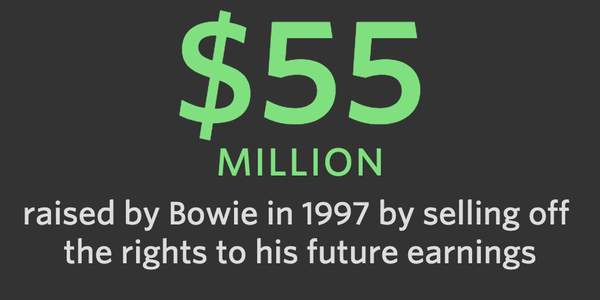Will EOS Finally Enable The Music Industry To Benefit From Blockchain Technology? Practical Use Cases Of Blockchain Technology For The Music Industry May Finally Be Achievable.
Everything from streaming and releasing music to the sale and release of concert tickets is rely heavily on major centralized services which hurts both artists and consumers.
When I first began to really dive into blockchain technology, I had the idea for a decentralized platform that enabled artists to release music, concert tickets, ect. all on the same platform. While I'm sure that many others have had similar ideas, I have only read about various streaming services which I don't think have seen much success. The advantages that blockchain technology could offer to the music industry as a whole are abundant, and because there are so many different practical use cases within the same industry, the need for a single platform able to host them all is absolute. I have nowhere near the capabilities to deploy anything like that, but maybe this will spark an idea within someone who is more capable than I currently am.

While I first considered the possibility of a platform similar to what I imaged having the ability to be deployed on the Ethereum network, it will likely be some time before the Ethereum network would be able to efficiently handle the required amount of activity and transactions needed to support it. When I first learned about EOS and their choice to build using a Graphene blockchain system, the ability to deploy this platform seems much more likely because of the capabilities of the Graphene blockchain. The following is just one example of a real world industry that could be vastly improved by blockchain technology.
How could the music industry benefit from blockchain technology?
When we consider everything from the way that concert goers have to purchase their tickets to the way listeners and artists are virtually forced to stream their music, the inefficiencies of centralized services becomes very clear. Ticket exchange sites such as Ticketmaster and StubHub charge enormous fees on consumers and artists alike, and in reality the service that they provide is not anything too special. A ticket exchange on the blockchain would be entirely achievable, especially if it was running as a DApp on a single platform. I will go into the specifics regarding how artists and consumers could benefit from a ticket exchange running on the blockchain, but it could offer serious increases in efficiency every step of the process.
When it comes to how individuals listen to their music, the majority of consumers still use a relatively few amount of different services of platforms to listen to their music, such as Apple Music, Spotify, YouTube, ect. While some of these streaming services still give individuals the choice of a subscription fee or having to listen to advertisements, they are often overpriced for the service they provide. The artists are the ones who really get the short end of the stick when it comes to streaming their music, because they often only see a small fraction of the money that their music actually generates. While I am personally of the opinion that individuals will not change their ways about paying for music anytime soon, I believe that a platform that enables users to stream music and music videos for free, while allowing the artists to monetize is entirely possible through a DApp.

What could a decentralized 'music industry' platform look like?
The sheer amount of inefficiencies that centralized services create in nearly all aspects of music interaction originally made me see the promise of a potentially decentralized music platform. Imagine that artists could not only stream their music and music videos on an application or website directly for their listeners, but also sell concert tickets and other items to their users directly. When we consider the Fees of over 15% from sites like Ticketmaster, StubHub, ect, the ability for a new platform to offer sufficient incentives for both artists and consumers to switch platforms seems very possible. I personally believe we have reached a point in time when individuals are not going to pay for music, but I believe the artists will still be able to monetize through the use of blockchain technology.
Let's first consider the advantages that DApps could offer to the artists. Instead of the aritst virtually being forced into releasing their music on centralized platforms, artists would have the ability to release their music directly to their listeners for free. While it may seem like there would be no way to monetize allowing users to monetize for free, a platform with a similar reward structure to Steemit that was specifically for music and videos could still enable artists and listeners to take part in the value that they create. Instead of an artist having to release their concert tickets on a platform like Ticketmaster, artists would have the ability to offer their customers a better price than they would have through a service, while the artist could still make more than they otherwise would have. While a platform enabling the linking of all of these DApps to each other would increase convince and ease of use for artists and consumers, the true value may be much greater than that.
In 1997 Musical David Bowie made financial history when he issued 'Bowie Bonds', which entitled the holder to a percentage of his future earnings.
While this is still relatively unheard of in the financial industry as well as the music industry, the idea of allowing individuals to directly invest in your future 'success' is truly revolutionary. Through the distribution of tokens that entitle the holders to a specified amount or percentage of the artists future earnings, artists or bands would have a much easier time raising capital. The possibility for artists distributing tokens for a variety of different things is completely practical, and would even give individuals a chance for low risk investment.

Even if a popular is doing a world tour, there is no guarantee that the tour will sell like they believe it will, and can make things risky for the artist. Now imagine instead of the artist taking the risk of bad ticket sales, let's imagine that the artist decided to offer individuals the chance to 'invest' in the success of the concert tour. For simplicity's sake let's assume that the artist will be doing 50 shows, and each stadium or venue has a max capacity of 20,000 seats. Let's assume that the overall average ticket price is $100. If the artist is able to sell out every show, then they would have sold 1 million tickets, and generated a total revenue of 100 million dollars. While this would be great for the artist and allow them to make significant profits, if the shows don't sell like they think they will then they may be at risk to loose money or make insufficient profits.
While an artist can often have a very good idea of how their tickets will sell, unforeseen circumstances can still occur which alter ticket sales. Instead of the artist taking this risk themselves, let's say they decided that they wanted to ensure themselves of a modest profit regardless of how the tickets actually sell. If the maximum revenue the tickets could generate was 100 million dollars, and the minimum amount needed to cover expenses was 50 million dollars, let's assume that the artist would be very happy giving themselves a guaranteed revenue of 70 million dollars. Through the use of platforms like EOS, artists would have the ability to 'sell' tokens which entitled the holder to a specific percentage of the total ticket revenue.
Since the artist wants to assure that they make 70 million dollars, lets say they distribute a million coins for 70 dollars each. If all of the tokens were bought at 70 dollars each, the artist has just guaranteed themselves a 70 million dollar revenue, but has lost the opportunity to make any money from the sale of the tickets on the tour. Users and investors who bought the token would have the have access to a proportional amount of revenue based on their amount of tokens. Depending on how the artist decided to distribute and release the tokens, the tokens would even have the potential to be traded and transferred among individuals and different parties.
Why does EOS actually have a chance at establishing this type of platform?
The factors of EOS such as its lightning fast transaction speeds, ability to scale, and the ability to adapt will likely make EOS a contender for the first platform to gain success from hosting successful DApps. This is not to say that there aren't any successful DApps on other networks, but simply that the true potential of DApps hasn't been shown as of yet. The reason that EOS would likely be best suited to handle a platform like this is because EOS will have the ability to 'interconnect' different DApps better than any other platform, and will allow users and consumers to access all of their music DApps using the same account through the uniform permissions EOS will enable.

A platform that would be created as virtually a music 'dashboard' allowing users access to ticket sales, streaming, and other things, would likely need a powerful and capable network to handle all of those transactions. While the transactions from ticket sales and token distribution could likely be handled by a less powerful platform, activities relating to storing votes, comments, ect. as transactions would need an extremely powerful network if it was adopted by the mainstream. Graphene based blockchain systems have proven their capabilities through the success and speed of Steem and Bitshares, and there is nothing that leads me to believe that the EOS network won't be even more capable.
While other platforms are likely to spring up in the future, and existing projects are likely to improve, I am still under the opinion that the first project to have the technical capabilities to actually scale will have the best chance at success. Ethereum is making advancements in terms of network efficiency and speed, but I am still not entirely convinced that the advantages EOS offers will be present on Ethereum anytime soon. EOS is being deployed with the goals of adaptability and ability to scale in mind, and I believe that gives it a direct advantage over the current projects in the market. EOS will be have an upper hand on the existing projects from the day it goes live, because superior technology and the various abilities that the technology gives the project.
I really hope that you enjoyed this post, and this was just one example of a practical and real world situation that could be improved through blockchain technology and the EOS platform. As always I urge you to leave any comments, questions, input, ect. below. Thanks for reading!
Thanks for the post, I know you are onto something much bigger here with blockchain applications across all industries becoming common in the next 5 years.
Namaste @hatchi
I'd done a couple pieces on the different projects at the music and blockchain intersection, the last being Music On The Blockchain: Updates, Developments, And The Blossoming Ecosystem...
Some good ideas in here. Like your foresight into practical application possibilities for EOS in this space...
There's some great info in the post you linked, Thanks for reading and the support.
Very clever concept. As always, the challenge will be for the smart contracts to interact with real world via some oracles (audience count, costs and other fees).
I think you're onto something here, keep it up!
what do you think Shavon?
@soundlegion
I think it's already being done with Muse: http://docs.bitshares.org/muse/index.html
Also see:
http://peertracks.com/
https://steemit.com/bitshares/@bunny/muse-updates-from-cob-muse-is-coming
meep
Hey cryptofreedom! Trying to get in touch :) Is it possible to have a chat about this article? :)